Würzburg
Würzburg or Wuerzburg (and sometimes misspelled as Wurzburg) is in Franconia, in northern Bavaria, Germany.
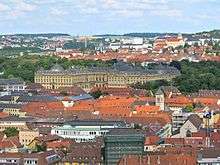
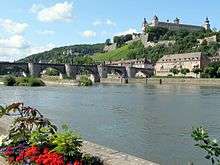
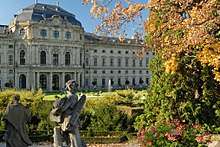
Understand
Founded in the 10th century, Würzburg served as the home of powerful prince-bishops for many centuries. It is renowned for the Residence, regarded as one of the finest palaces in Europe and a high point of Baroque art (UNESCO cultural world heritage). Würzburg is also home to one of the oldest churches in Germany, built in the 8th century on top of a former pagan shrine. One of its most famous structures, Festung Marienberg, is a fortress which now surrounds the church.
Würzburg was the center of the kingdom known as Franconia. In the 19th century, Napoleon merged Franconia with Bavaria, by which the city is ruled to this day.
Würzburg experienced heavy demolition during a 20-minute bombing raid in 1945 which destroyed some 80% of its city buildings. Much of the city has since been rebuilt, though not as painstakingly true to its original architecture as some other historic German communities. Anyone eager to visit this town to study its historic architectural structures should be prepared to see its restored buildings placed next to several post-war modernistic houses. Würzburg has been home to a large US military installment since post-World War II reconstruction. As a result, many of the locals are familiar with American customs. However, as of 2006, the military base is scheduled to close which will cause the city to lose most of its American presence.
Today Würzburg is a beautiful, historic, and lively city that is often overlooked by foreign visitors.
Get in
By plane
Würzburg is not served by an airport. However, if you fly into Frankfurt, Nuremberg or Munich, the Deutsche Bahn can get you anywhere that's worth going. Get on an ICE train, which will take you 85 minutes from Frankfurt until you reach the Hauptbahnhof in Würzburg, from Munich the ICE gets you there in exactly 2 hours and by car it takes around 3 hours (vastly depending on traffic). If you arrive from Nuremberg or Munich, especially when traveling in a small group and time isn't absolutely critical, consider the Bayern Ticket, that is only valid on regional trains (no ICE or IC) as well as all VGN buses.
By train
🌍 Würzburg Hauptbahnhof (train station) can be reached directly from most any train in western Germany. To get there from Berlin will require a change. This will usually occur in Göttingen. As Würzburg is the southern terminus of Germany's first high speed railway line specifically built for the ICE connections are remarkably fast, with Frankfurt being just one and a half hours away. Speed does however come at a price, and unless you buy your tickets in advance you will pay a lot. Tickets on the ICE start at 29€ per person (group discounts available) when bought in advance with the number of cheap tickets lower and sold out faster on popular routes and times.
For regional trains throughout Bavaria you can get the Bayern Ticket, that costs 23€ for one person and 5€ for every additional member of your group up to five and is valid for one day (starting at 9 am unless it is a Sunday or public holiday). The Bayern ticket is also accepted on some buses and urban rail systems, notably those of the VGN, that covers most of Franconia.
Get around
Würzburg has a good public transport system with trams and buses. Public transportation maps and timetables can be found from VVM-Info.
See
- 🌍 Würzburger Residence, Residenzplatz 2, ☎ +49 931 355170. 9am - 6 pm Summer 10am-4.30pm winter. one of the finest Palaces in Europe and is famed for its magnificent staircase. It is regarded as one of the finest pieces of Baroque art in the world as such it has been inscribed on the UNESCO World Heritage List. The building was designed by Balthasar Neuman, and the Fresco above the Staircase was painted by Tiepolo, it is reputed to be the largest in the world. The palace has 300 rooms, spread over 3 wings. There is also a Chapel decorated by Tiepolo which is free to enter and well worth a visit Entrance is €6.50.
- Würzburger Residence gardens (situated behind the Palace). free to enter.
There are several old, beautiful churches in town to visit and marvel at, cafes, shops and eating establishments to spend time in as well as taking in a guided tour of the city.
- 🌍 Festung Marienberg (Marienberg Fortress and Princes' Building), ☎ +49 931 3551750. Enjoy the beautiful view over the city and the Main from the fortress' walls which are open freely to the public. The castle's pay-admission museum is a somewhat confusing experience to foreign visitors and could be avoided as it is almost entirely in German. No English language guiding is available. Also note that most of the Marienberg's once very rare collections and interior were destroyed in a fire during the war. Today's interior and the present collections are a sad replacement.
Do
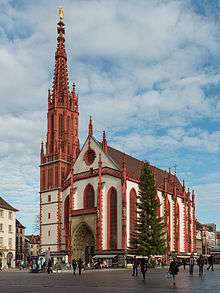
Wine fairs
- Würzburger Weindorf ("Wine Village"), on Market Square, the biggest of all, end of May.
- Hofgarten Weinfest, in the Court Gardens of the Residence Palace, in July.
- Weinfest am Stein, in a winery in the vineyards. With live music, crowded, in July.
- Weinparade, on Market Square, end of August.
Nearly every winegrowing village in Lower Franconia has its own wine fair, so you can visit at least one if you visit Würzburg in summer or fall months.
Other festivals
Africa Festival, one of the biggest festivals about African culture. Mostly about May or June.
Buy
Wine
Germany may be world renowned for its beer, but its wine is its hidden treasure. Franconian wine is among the best in the country and Wuerzburg has been growing grapes since its first contact with the Romans. Be sure to pick up a memory that will last by picking up a bottle of wine. Franconian wine is often sold in special bottles named "Bocksbeutel". Normally having 3/4 litres there also exist smaller ones with 3/8 litres. These bottles look small and fat. If you do not know much about wine, buy it directly from the winegrowers or from small shops which sell only wine. They do know...
Eat
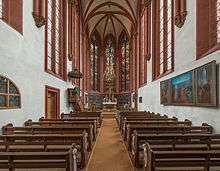
There are some great restaurants in Würzburg, catering for all spectrums.
Great restaurants in the town centre serve excellent food in rustic settings with by no means unreasonable prices. Service is great and you can be guaranteed a great meal. These include
- 🌍 Alte Mainmuehle, Mainkai 1, ☎ +49 931 16777.
- 🌍 Burgerspital Weinstuben, Theaterstraße 19, ☎ +49 931 352880.
- 🌍 Alter Krahnen, Kranenkai 1, ☎ +49 931 99131545, e-mail: info@alterkranen.de. daily 11:00 - midnight. very delicious Franconian cuisine, great beer garden overlooking the fortress Marienberg and the Main
- Juliuspital.
- Stachel.
It mustn't be forgotten that Würzburg is a student town, so local establishments cater accordingly. These tend to be situated in the southern sector of the town on Sanderstraße. Here you can expect a good honest meal at very reasonable prices in a friendly atmosphere. Recommended are
- Unicafe (on the corner of Neubaukirche and Sanderstraße).
- Cafe Muck, Sanderstraße.
- Cafe Kult, Sanderstraße.
Takeaways include
- Tigris.
- Pinar.
- MC' Döner. Best Döner in town is at the West end of the Alte Mainbrucke. Fresh pitas regularly.
Only decent Mexican food
- Joe's.
At the higher end
- Schloss Steinburg (Situated a few kilometres north west from the centre of town). it is perched above a vineyard overlooking the river Main, the town, and with great views across to the Marienberg. Prices are naturally at the high end, but for fabulous food, great views, and an unforgettable ambiance - this is the place.
Drink

The local brewery, Würzburger Hofbraeu, brews excellent wheat beer (Weißbier), which carries the name of a 1600s bishop of Würzburg, Julius Echter. Basically this beer is served for you in almost all the local bars, if you order a Hefe.
Würzburg resides in the middle of Franconian wineland and Frankenwein is served in many places. You can recognize the peculiar shaped bottle, Bocksbeutel, easily.
Sleep
- 🌍 Babelfish Hostel, Haugerring 2 (Next to the railway station), ☎ +49 9313040430, e-mail: info@babelfish-hostel.de.
- 🌍 Jugendherberge, Fred-Joseph-Platz 2 (Below the fortress of Marienberg on the left bank of the river Main), ☎ +49 931 4677860, e-mail: wuerzburg@jugendherberge.de.
- 🌍 Goldenes Fass, Semmelstraße 13, ☎ +49 931 45256810.
- 🌍 Hotel Franziskaner, Franziskanerplatz 2, ☎ +49 931 3563-0.
- 🌍 Hotel Zum Winzermännle, Domstraße 32, ☎ +49 931 - 54156.
- 🌍 Maritim Hotel Würzburg, Pleichertorstraße 5 (am Congress- Zentrum / Friedensbrücke), ☎ +49 931 3053-0, e-mail: info.wur@maritim.de.
- 🌍 Hotel Schloss Steinburg, Am Steinberg, ☎ +49 931 9702-0.
- 🌍 City Hotel, Semmelstraße 28 + 30, ☎ +49 931 78 00 99 0. single 59-79, standard double 69-99, comfort double 69-110, triple 98-139.
Go next
Würzburg is the start of Germany's famed Romantic Road. From here you can travel down to Rothenburg and the Bavarian Alps.
- Bamberg is less than an hour away and is included on the UNESCO World Heritage List
- Veitshöchheim: Take a boat ride on the river Main to this small picturesque town that also has a Schloss with a Rococo garden. (The dock in Würzburg is beside the street Kranenkai, literally "crane dock" as there is an old crane on the boat dock.) The town is also accessible by rail.
- In Wertheim (about 35 km away), you can travel the route Charming Tauber valley from Wertheim via Tauberbischofsheim and Bad Mergentheim to Rothenburg ob der Tauber.